The article delineates five potent digital marketing strategies tailored for hotels aiming to amplify revenue. It highlights the critical role of:
Each strategy is substantiated by compelling examples and data, illustrating how these methods can elevate visibility, captivate potential guests, and ultimately drive bookings in an increasingly competitive landscape.
In an increasingly competitive hospitality landscape, hotels confront the urgent challenge of distinguishing themselves and capturing the attention of potential guests. The digital realm presents a myriad of opportunities for accommodations to enhance their visibility and drive revenue; however, determining where to concentrate efforts can be overwhelming.
This article explores five potent digital marketing strategies specifically designed for hotels, demonstrating how they can harness:
These strategies not only attract guests but also cultivate enduring connections. How can hotels adeptly navigate these strategies to ensure they not only survive but thrive in 2025 and beyond?
To enhance visibility, accommodations must prioritize , particularly through . This begins with to uncover the phrases prospective visitors are using, such as 'luxury accommodations in [location]' or 'family-friendly resorts near [attraction].' Integrating these keywords naturally into the website's content—including titles, headers, and meta descriptions—is crucial for effective optimization.
in this process. By claiming and frequently updating , accommodations can significantly enhance their chances of appearing in local search results. Moreover, consistently refreshing the website with engaging content, such as blog posts about local events or attractions, can enhance search rankings and captivate visitors. For instance, an accommodation in Miami might create a blog entry detailing the best beaches in the area, seamlessly incorporating relevant keywords to attract search traffic. This method not only enhances visibility but also positions the establishment as a local authority, ultimately promoting reservations from interested travelers.
Furthermore, accommodations should concentrate on site speed, as a is crucial for maintaining visitor engagement and lowering bounce rates. Regularly updating website content to showcase seasonal offerings and address evolving traveler priorities is vital for maintaining relevance and improving search rankings. Creating dedicated landing pages for specific events, such as 'hotels for Formula 1 in Austin,' can further illustrate effective local SEO strategies.
are necessary to adapt to changing traveler behaviors and search engine algorithms. Utilizing tools like and Google Search Console is essential for monitoring SEO performance, tracking success, and refining strategies. Additionally, accommodations should be aware of common pitfalls to avoid in SEO, such as neglecting mobile optimization or failing to respond to guest reviews, which could mislead property owners.
Successful examples of digital marketing for hotels demonstrate that a well-structured SEO optimization strategy can lead to increased direct bookings and enhanced online presence. As the digital landscape evolves, staying updated with current best practices is essential for establishments aiming to thrive in a competitive market. By concentrating on local SEO, establishments can effectively reach individuals searching for lodgings in their area, resulting in a significant effect on reservations in 2025 and beyond.
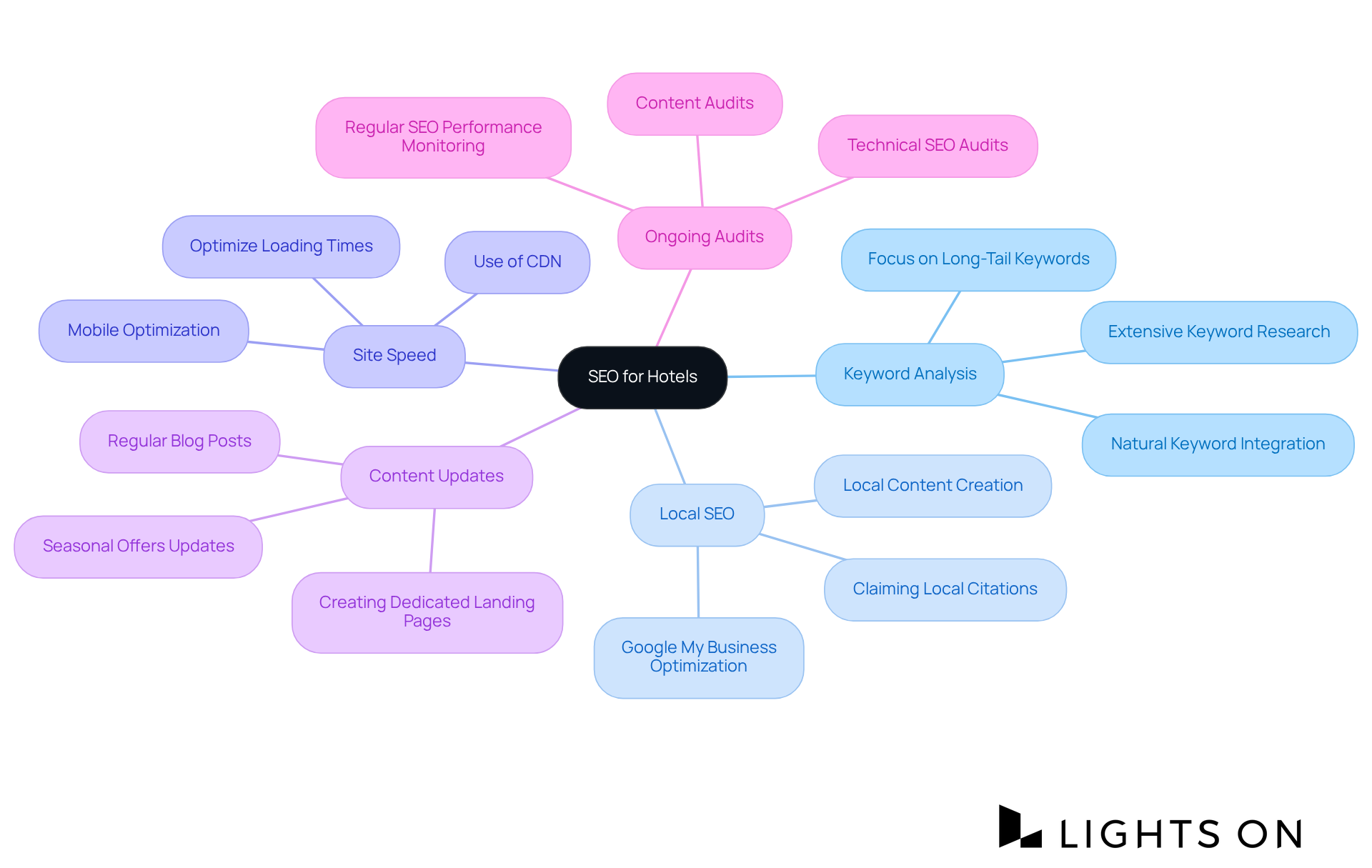
Successful promotional strategies in are essential for accommodations aiming to connect with prospective visitors. A well-crafted strategy for digital marketing for hotels should encompass various formats, such as blog articles, videos, and social media updates, that highlight the unique features of the property and its surrounding attractions. For example, accommodations can produce a series of engaging videos showcasing local cuisine, featuring interviews with chefs, or providing behind-the-scenes insights into their operations.
Incorporating , such as visitor reviews and images, enhances authenticity and fosters engagement. and emphasizes genuine visitor experiences. By sharing stories that reflect the establishment's values and experiences, accommodations can use digital marketing for hotels to cultivate a stronger connection with their audience, motivating them to choose the venue for their next visit.
A notable example is a small lodging establishment that effectively shares visitor stories on its blog, nurturing a sense of community and encouraging repeat visits. As Ronn Torossian emphasizes, successful digital marketing for hotels revolves around that resonate with both prospective guests and the media. In 2025, accommodations must prioritize storytelling and local immersion in their digital marketing for hotels to stand out in a competitive landscape, ensuring their content not only informs but also inspires travelers. Furthermore, with 44% of consumers indicating that their accommodation choices, utilizing digital marketing for hotels through becomes increasingly crucial. Additionally, as in accommodation promotion, integrating eco-friendly strategies into marketing efforts can further enhance visitor engagement and loyalty.
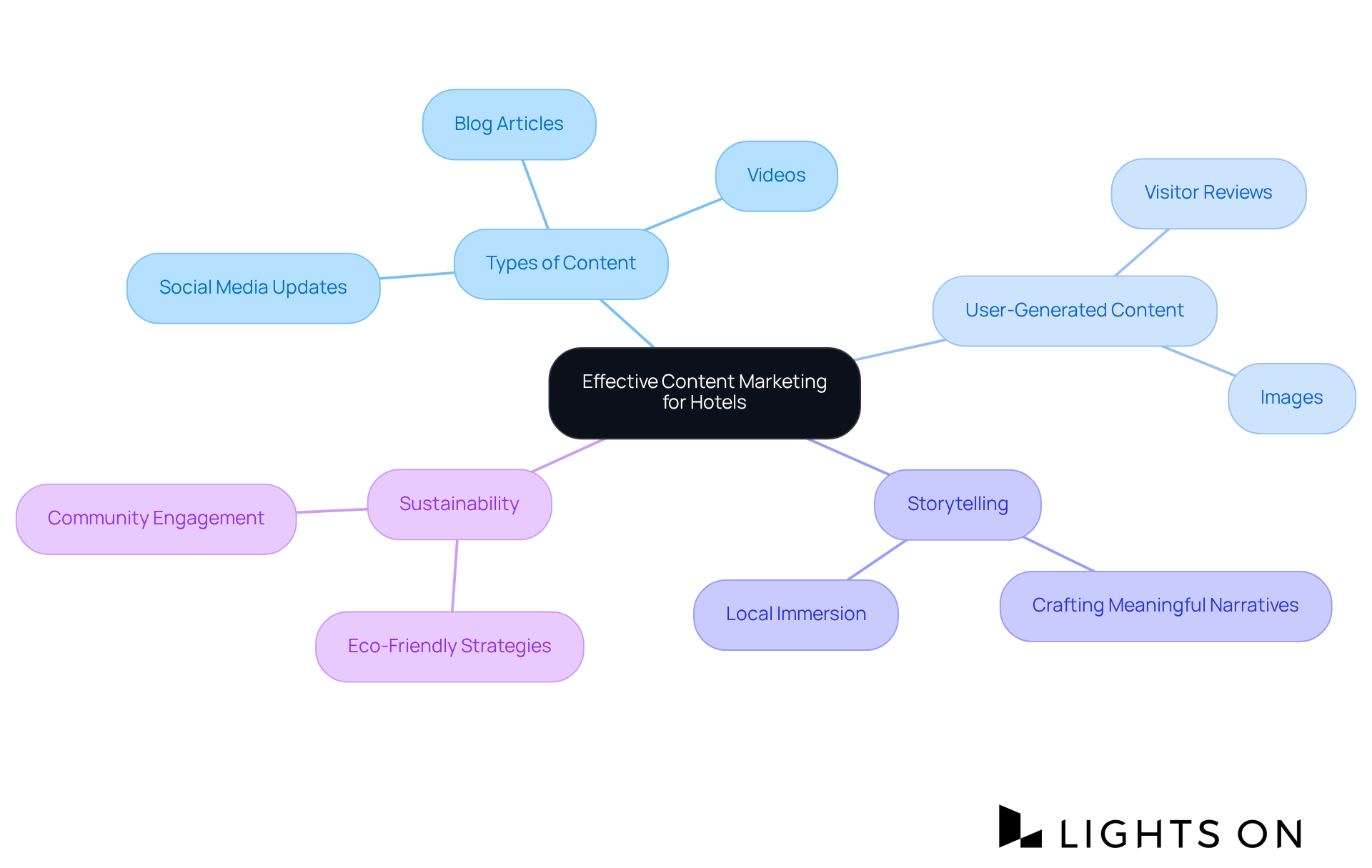
To effectively engage with visitors, accommodations must develop a comprehensive focused on , prioritizing consistent posting, , and proactive interaction with followers. Platforms such as Instagram and Facebook are essential venues for showcasing breathtaking images of the property, local attractions, and memorable visitor experiences through [digital marketing for hotels](https://cesarritzcolleges.edu/en/news/social-media-marketing-strategy-for-hotels).
As DJ Vallauri aptly states, "Your visitors don’t just want a reservation—they want a memory," underscoring the necessity for accommodations to forge . Furthermore, organizing contests that encourage participants to share their photos using designated hashtags not only fosters a sense of community but also serves as an effective strategy in digital marketing for hotels by amplifying brand visibility.
For example, featuring a 'Guest of the Week' on Instagram highlights individual experiences while inspiring others to share their narratives. This approach not only enhances engagement but also demonstrates the hotel's dedication to visitor satisfaction. In addition, integrating (UGC) in digital marketing for hotels can significantly enhance brand credibility, as it is frequently viewed as more genuine than corporate communications.
Promptly addressing comments and messages fortifies positive relationships with potential visitors, making them feel valued and connected. is also crucial for evaluating the effectiveness of digital marketing for hotels, ensuring that accommodations can refine their methods and maximize their impact.
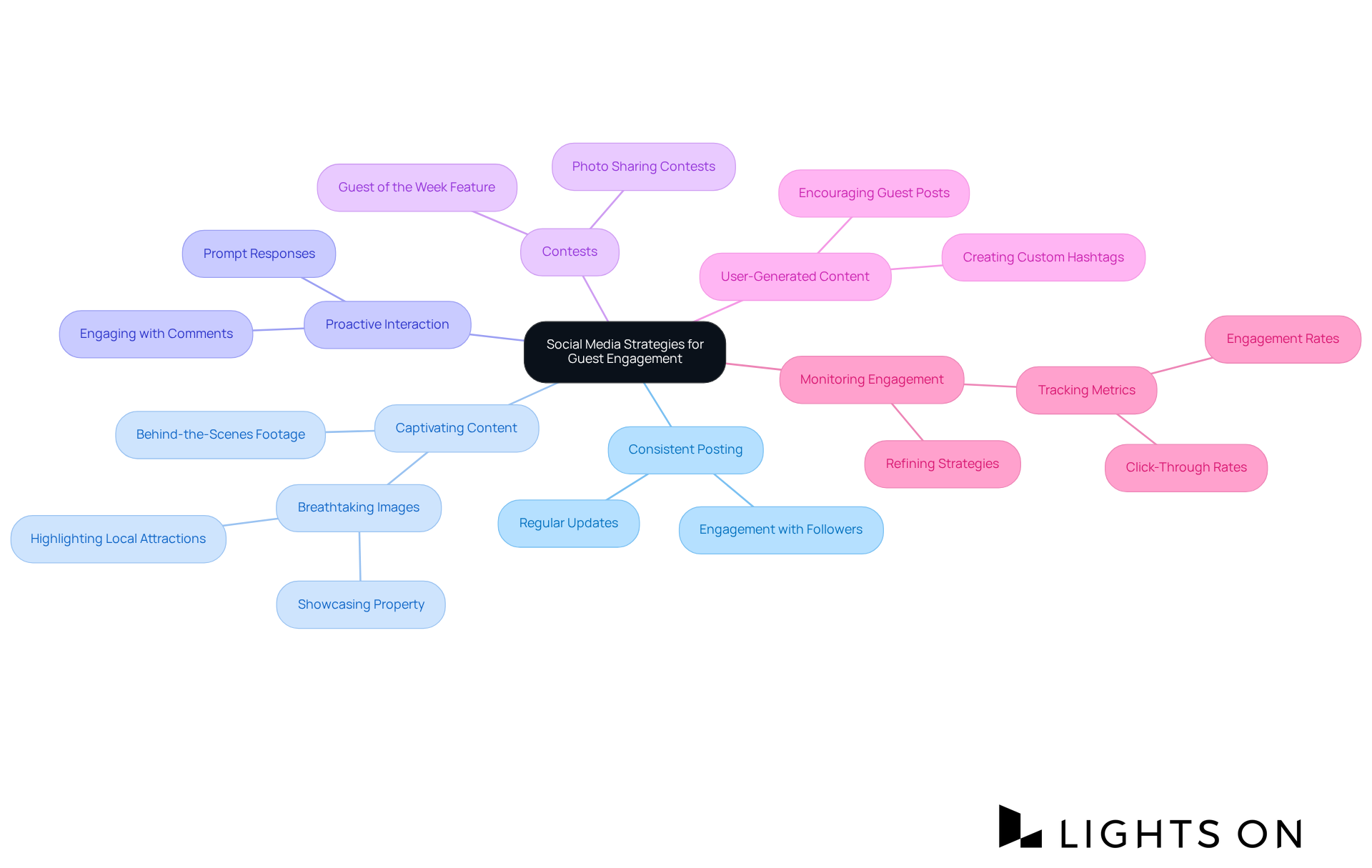
Customized serves as a powerful tool for accommodations, enabling them to categorize their email lists based on visitor preferences, , and demographics. By dispatching —such as discounts for returning visitors or special packages for anniversaries and birthdays—hotels can significantly boost .
Furthermore, sharing relevant information, including local activities or seasonal promotions, ensures that the establishment remains top-of-mind for previous visitors. For instance, an accommodation might follow up with a thank-you email post-stay, offering a discount for their next reservation. This strategy not only encourages but also cultivates loyalty and enriches the overall guest experience.
A notable case study illustrates an establishment that executed a , achieving an impressive 30% increase in repeat bookings within just six months. Marketing experts stress that is essential; as one expert remarked, 'Segmented email campaigns generate more engagement, with a reported 100.95% higher click-through rate.' This underscores the potential of in digital marketing for hotels to and strengthen customer relationships within the hospitality sector.
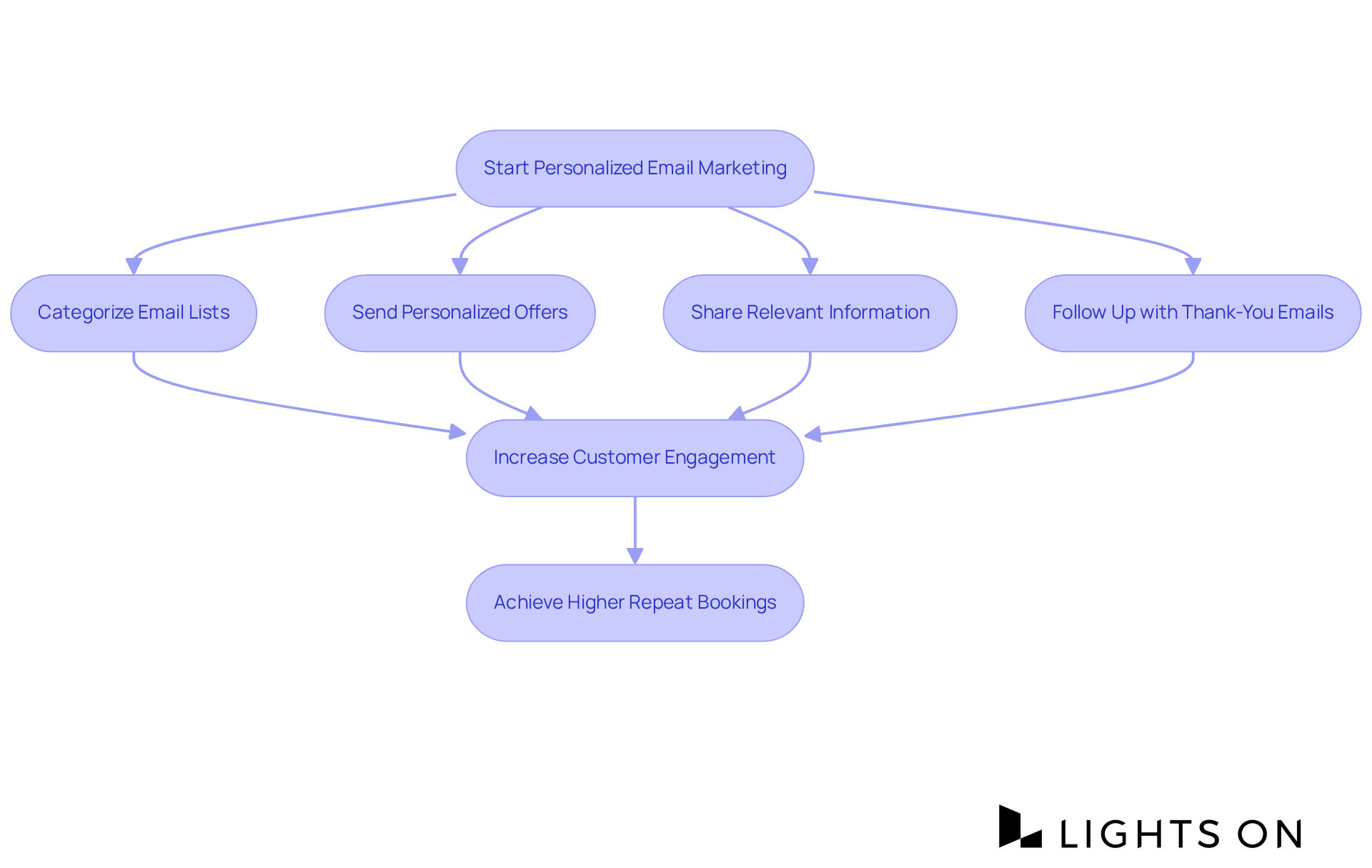
To effectively harness the power of , they must prioritize the creation of , amenities, and local experiences. This strategy can include:
Short-form content tailored for platforms like TikTok and Instagram Reels can swiftly capture attention and increase engagement. For instance, a hotel might produce a series of clips that feature local attractions, inspiring viewers to explore the region during their stay. By integrating narrative elements into these videos, hotels can evoke emotions and leave a lasting impression on potential visitors.
A notable example involved a resort that effectively utilized , significantly boosting engagement and reservations through social media channels. With 92% of consumers trusting posts from others more than brand advertisements, such can be transformative in attracting new guests. Furthermore, in 2022, for the first time, underscoring the growing importance of visual material in marketing strategies for accommodations. By utilizing [digital marketing for hotels](https://lightson.co/category/10-proven-revenue-strategies-for-hotel-owners-to-maximize-earnings) to produce content that highlights local areas and travel experiences, hotels can enhance their visibility and draw in potential guests, thereby increasing engagement.
Moreover, but also improves SEO rankings, establishing it as a multifaceted tool for driving visibility and bookings. As the landscape of hospitality marketing evolves, embracing digital marketing for hotels through is essential for hotels aiming to thrive in a competitive market.
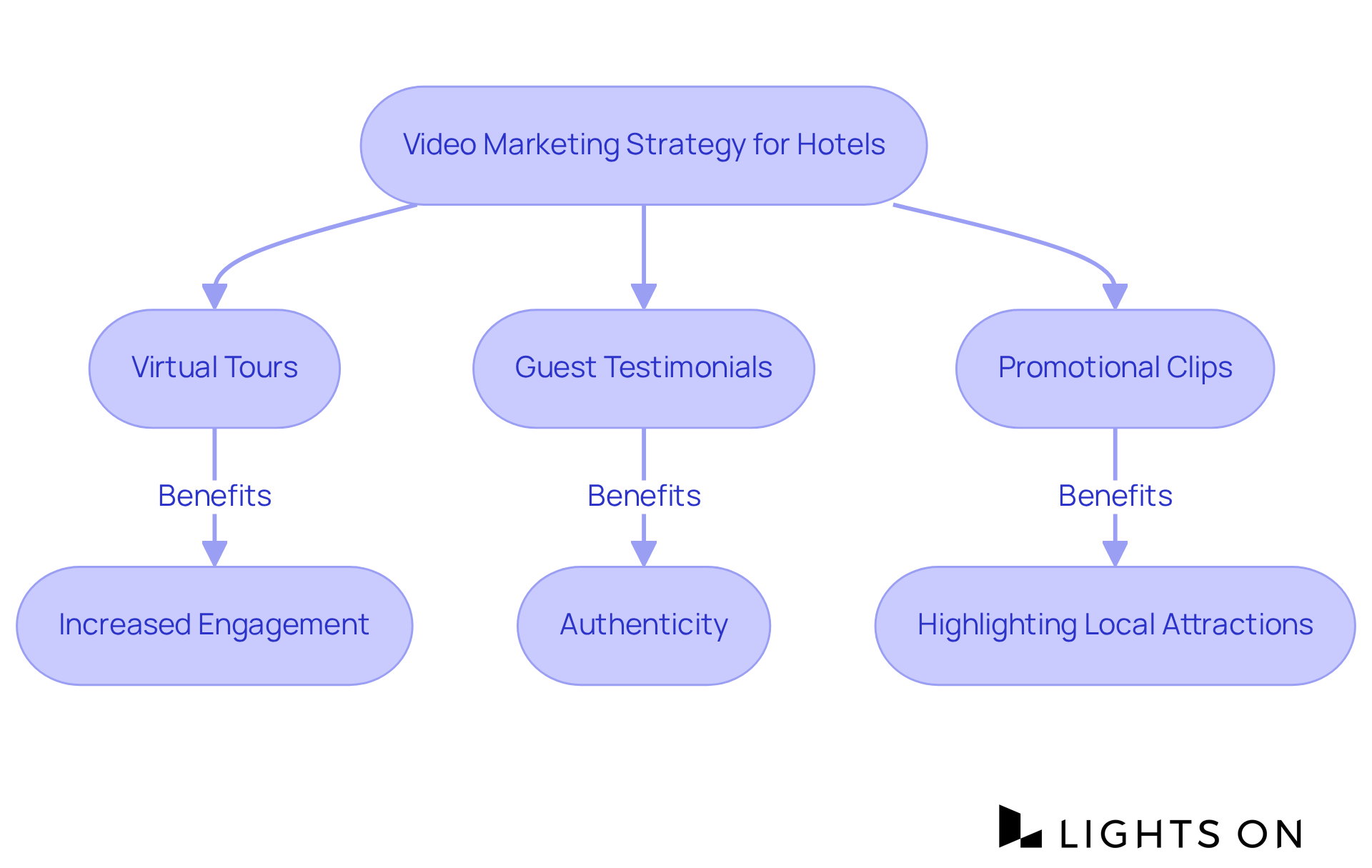
Digital marketing strategies are crucial for hotels seeking to enhance their revenue and visibility in a fiercely competitive landscape. By concentrating on essential areas such as:
hotels can effectively attract and retain guests while showcasing their distinctive offerings.
This article delineates various strategies that hotels can implement to amplify their digital presence. Effective SEO practices, including local SEO and regular content updates, assist hotels in ranking higher in search results, thereby increasing their discoverability to potential guests. Content marketing, particularly through storytelling and user-generated content, cultivates a genuine connection with audiences. Social media strategies empower hotels to engage with visitors on a personal level, while personalized email campaigns bolster customer loyalty and encourage repeat bookings. Finally, leveraging video marketing can vividly illustrate the hotel's amenities and local experiences, enticing potential guests through captivating visuals.
As the hospitality industry evolves, embracing these digital marketing strategies is not merely advantageous but imperative. Hotels must adapt to the shifting preferences of travelers by prioritizing authentic engagement and memorable experiences. By implementing these best practices, accommodations can not only enhance their revenue but also forge lasting impressions that inspire guests to return time and again.
What is the importance of search engine optimization (SEO) for hotels?
SEO is crucial for hotels to enhance their visibility online, attract prospective visitors, and increase direct bookings through effective digital marketing strategies.
How can hotels identify the right keywords for their SEO strategy?
Hotels can conduct extensive keyword analysis to discover phrases that potential visitors are using, such as "luxury accommodations in [location]" or "family-friendly resorts near [attraction]."
What role does local SEO play in hotel marketing?
Local SEO helps accommodations appear in local search results by claiming and frequently updating Google My Business listings and creating engaging content about local events and attractions.
How can hotels improve their website's search rankings?
Hotels can enhance their search rankings by regularly updating their website with fresh content, optimizing site speed, and creating dedicated landing pages for specific events.
What tools should hotels use to monitor their SEO performance?
Hotels should utilize tools like Google Analytics and Google Search Console to track their SEO performance, monitor success, and refine their strategies.
What common pitfalls should hotels avoid in their SEO efforts?
Hotels should avoid neglecting mobile optimization and failing to respond to guest reviews, as these can negatively impact their online presence and mislead property owners.
How can content marketing engage potential hotel guests?
Content marketing can engage potential guests by using various formats such as blog articles, videos, and social media updates that highlight the hotel's unique features and surrounding attractions.
Why is user-generated content important for hotels?
User-generated content, like visitor reviews and images, enhances authenticity, builds trust, and emphasizes genuine experiences, fostering engagement with prospective guests.
What storytelling techniques can hotels use in their marketing?
Hotels can craft impactful stories that resonate with prospective guests and the media, sharing visitor experiences that reflect the establishment's values and encourage repeat visits.
How can sustainability be integrated into hotel marketing?
Hotels can enhance visitor engagement and loyalty by incorporating eco-friendly strategies into their marketing efforts, appealing to the growing consumer interest in sustainability.
Transform your group booking strategies with Lights On and watch your occupancy soar.